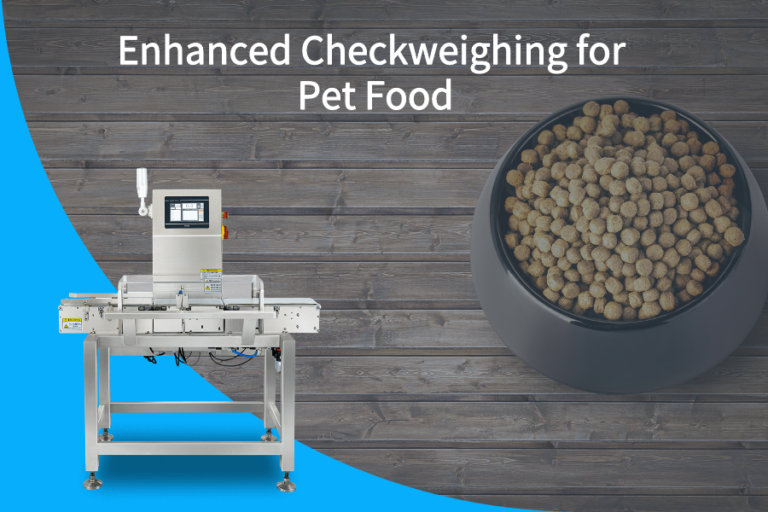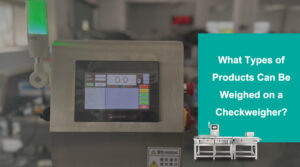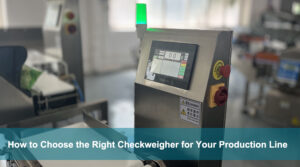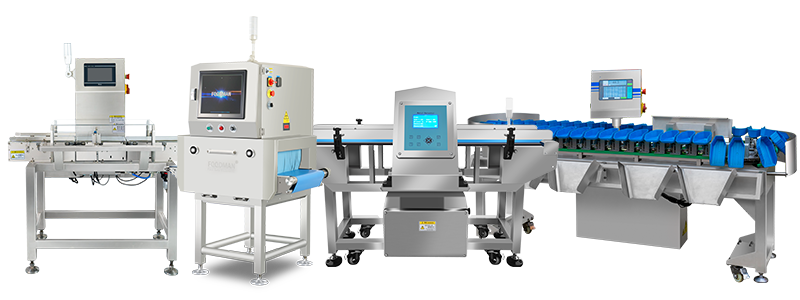Introduction
High precision and effective quality control measures are essential in the manufacturing of pet foods. These standards go beyond adhering to industry standards; they reflect our commitment to the health and well-being of these human companions. Indeed, unlike humans, our pets may not have much to say about their diet; they look to us for their dietary needs.
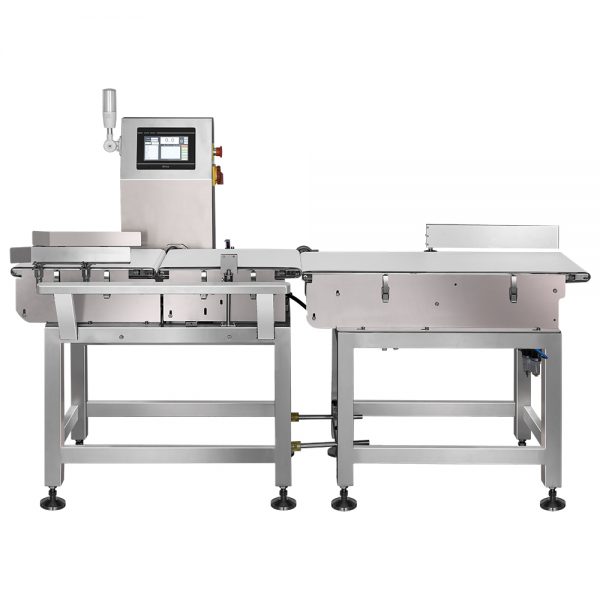
Therefore, we must strive to provide them with the very best. One way to achieve this is integrating checkweigher systems into pet food manufacturing processes. This device helps ensure accurate weight measurement, food quality, and adherence to industry standards.
This article explores the need for checkweighing in the pet industry and the benefits of the device in pet food manufacturing, among other intricacies.
Why We Need Checkweighing in the Pet Food Industry
The pet food manufacturing industry experiences peculiar challenges in ensuring quality, consistency, and safety. However, checkweigher can significantly address some of these challenges, particularly in weight consistency and packaging control.
This section explores reasons checkweighing is vital to the pet food industry.
Increased Efficiency and Accuracy
As the name suggests, checkweighing systems automate weight-monitoring, ensuring accurate product weight and efficient product packaging. This feature may prove crucial for identifying compromised pet food items, as deviation from required weight can serve as such indication. Integrating checkweighing into production lines helps minimize inconsistencies and human errors.
Accurate weight control is essential in ensuring quality, as deviations, particularly excess weight, may suggest the presence of impurities. Therefore, the checkweigher machine ensures each package maintains the desired weight specifications, eliminating errors and waste. In addition, the device also helps accelerate production speed and ensures optimal weight control by minimizing potential overfilling or underfilling pet foods.
Real-time Weight Monitoring
One of the essential features of checkweighing systems is their real-time weight monitoring. The devices allow pet food manufacturers to monitor the products’ weight in real-time, allowing them to respond to any deviations or issues quickly. With this device, manufacturers can immediately detect any product weight discrepancy and take the required corrective actions to address the problem.
In addition, since the checkweigher machine monitors the weight in real-time, it ensures the smooth and continuous running of the production process. The manufacturers or the device operator can quickly attend to any potential issue.
Compliance With Regulations
All pet food manufacturers must ensure their products adhere to specific regulations and standards, such as those set by the FDA and AAFCO. Iterating checkweighing systems into the manufacturing process may prove effective for complying with these standards. A typical requirement of these requirements is ensuring accurate weight, which we have emphasized the checkweighing system guarantees.
That said, after ensuring accurate weight, other regulations such as weight labeling, proper packaging, and required documentation are easier to achieve. Again, the use of checkweighter ensures these pet food manufacturers can show commitment to quality, safety, and regulatory compliance.
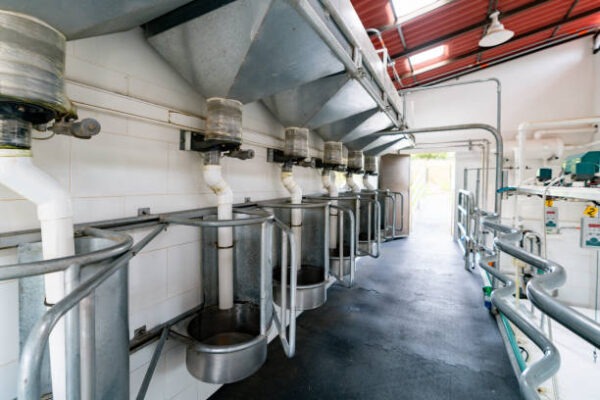
Benefits of Checkweigher Systems in Pet Food Production
We have already examined why pet food manufacturing companies require checkweigher systems. However, this section will focus more on the benefits of this device in pet food production.
Seamless Integration into Production Lines
Since checkweigher systems provide real-time weight monitoring of pet foods during manufacturing, they seamlessly integrate with the production lines. Therefore, the device minimizes production downtime, reduces manual error, increases production capacity, and maximizes efficiency. The device proves crucial for optimizing the production workflows, allowing you to process higher volumes of products without compromising accuracy and quality.
Moreover, the device’s operations are automated and work independently, allowing the manufacturer to focus on other critical production aspects. The manufacturer need not worry about inaccuracies or inconsistencies in the pet food weights; the device assures that the desired weight specifications will be attained.
Enhancing Quality Control Measures
Weight accuracy is essential to proper quality control measures in pet food manufacturing. Therefore, checkweighers may prove effective for conferring quality control measures, as the device guarantees accurate weight labeling. Remember, they ensure compliance with regulatory standards and prevent underfilling or overfilling pet foods, ensuring quality throughout production.
Besides the final weight of the pet food product, the device is also effective for ensuring the precise weight of each item and raw materials used in the production process. Therefore, it may ensure product consistency, including taste and nutritional value. The device typically ensures that all necessary quality measures that weight can influence are adhered to, which may prove effective in building customers’ trust and loyalty.
Cost Reduction
By optimizing the manufacturing process, checkweigher systems may effectively maintain cost-effective production. Moreover, it helps minimize wastage since the precise weight required in each step reduces the potential for excess weight. The device also helps reduce manual labor costs, reducing the need for operators, particularly those that will help monitor weight accuracy.
Another way checkweigher helps reduce cost is by minimizing product rework and possible recalls. All these features may prove effective in driving efficiency and increasing profitability. Therefore, every pet food production company should invest in a checkweigher system, which may be significant in ensuring quality and staying competitive.
Choosing the Right Checkweigher Machine for Your Pet Food Processing
All pet food manufacturers must ensure the selection of a suitable checkweigher machine for their pet food processing to maintain precise weight control, efficient production, and compliance with regulations. Various checkweighers are available; therefore, some factors must be considered before making the right choice.
Types of Checkweighers
Pet food manufacturers utilize several types of checkweighers during the processing of their products. These companies must ensure that they select the checkweigher type that best suits their processing and manufacturing needs.
For example, at Easyweigh, we have the following types of checkweigher systems.
- High-Speed and Accuracy Checkweigher: Our high-speed and accuracy checkweigher is designed to meet the demands of high-paced production environments. The checkweigher features advanced tech and precision engineering, making it suitable for rapid and precise weighing of pet foods and packages and seamless integration into bulk-volume production lines.
- General Purpose Dynamic Checkweigher: As the name suggests, our general purpose dynamic checkweigher is known for its versatility and reliability. It ensures the weight accuracy of an extensive range of products, including pet foods. It suits production lines with diverse variations in product sizes, shapes, and weights.
- Heavy Weight Checkweigher: Our heavy-weight checkweigher is your go-to system for ensuring the weight accuracy of bulky and heavy products. The device features a robust construction with potent weighing functionalities, ensuring accuracy and maintaining quality standards.
Factors to Consider
When selecting checkweigher systems, some factors are essential to ensure you make the right choice. Some of these factors include:
- Throughput Rate: This refers to your production capacity, speed, and how often you need to weigh items in your manufacturing company. You need to select a checkweigher device that can keep up with your production line so that it won’t slow down the production process.
- Product Size, Shape, and Weight Range: The product size, shape, and weight range are other important factors that require consideration. The checkweigher must withstand the weight of the products you’d be weighing.
- Budget and Cost Considerations: Acquiring a checkweigher for your food manufacturing needs is usually a capital investment. Therefore, companies must ensure to factor in the initial cost of the device, including regular maintenance costs. Afterward, you can select the checkweigher device that fits your budget and specifications.
- Integration With Existing Equipment: While a checkweigher is vital for driving quality, it is recommended that the one you acquire for your company integrates with other existing gadgets. This helps maintain proper workflow and enhance efficiency.
Careful consideration of these factors will help food manufacturers decide when choosing a checkweigher device for their processing needs.
Customization Options
Many manufacturers of checkweigher systems offer customization options to allow their customers, such as pet food producers, to tailor the device to their specific requirements. Below are the go-to customization options for checkweighers.
- Customized Checkweigher Conveyor Systems: Some pet food manufacturers may customize their Checkweigher conveyor systems to accommodate different product sizes and shapes.
- Software Customization: The software is another critical component of checkweigher systems that support customization. Pet food manufacturers may customize or optimize the device software to suit their unique needs, such as identifying specific weight thresholds or rejection mechanisms.
- Integration with Other Inspection Systems: One of the go-to customization options for checkweighers is integrating the device with other inspection systems. These help reinforce the quality control solutions achieved by the device. Typical inspection system manufacturers integrate checkweighers with metal detectors.
Conclusion
Checkweighers are essential for accurate weight measurement, which is integral to ensuring the quality of pet foods. The device also gives pet food manufacturers who invest in it an edge, as they are assured that their products are precise and adhere to industry standards of quality and safety.

